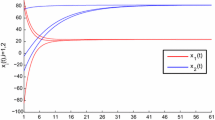Abstract
In this paper, global exponential stability in Lagrange sense is further studied for continuous recurrent neural network with three different activation functions. According to the parameters of the system itself, detailed estimation of global exponential attractive set, and positive invariant set is presented without any hypothesis on existence. It is also verified that outside the global exponential attracting set; i.e., within the global attraction domain, there is no equilibrium point, periodic solution, almost periodic solution, and chaos attractor of the neural network. These theoretical analysis narrowed the search field of optimization computation and associative memories, provided convenience for application.
Access this chapter
Tax calculation will be finalised at checkout
Purchases are for personal use only
Preview
Unable to display preview. Download preview PDF.
Similar content being viewed by others
References
Hopfield, J.J.: Neurons with Graded Response Have Collective Computational Properties Like Those of Two-state Neurons. Proc. Natl. Academy Sci. 81, 3088–3092 (1984)
Chua, L.O., Yang, L.: Cellular Neural Networks: Theory. IEEE Trans. Circuits Syst. 35, 1257–1272 (1988)
Liao, X.X.: Stability of Hopfield-type Neural Networks (I). Science in China, Series A 38, 407–418 (1995)
Liao, X.X.: Mathematical Theory of Cellular Neural Networks (I). Science in China, Series A 24, 902–910 (1994)
Liao, X.X.: Mathematical Theory of Cellular Neural Networks (II). Science in China, Series A 24, 1037–1046 (1994)
Liao, X.X., Wang, J.: Algebraic Criteria for Global Exponential Stability of Cellular Neural Networks with Multiple Time Delays. IEEE Trans. Circuits and Systems I. 50, 268–275 (2003)
Liao, X.X., Wang, J., Zeng, Z.G.: Global Asymptotic Stability and Global Exponential Stability of Delayed Cellular Neural Networks. IEEE Trans. on Circuits and Systems II, Express Briefs 52, 403–409 (2005)
Shen, Y., Jiang, M.H., Liao, X.X.: Global Exponential Stability of Cohen-Grossberg Neural Networks with Time-varying Delays and Continuously Distributed Delays. In: Wang, J., Liao, X.-F., Yi, Z. (eds.) ISNN 2005. LNCS, vol. 3496, pp. 156–161. Springer, Heidelberg (2005)
Zeng, Z.G., Wang, J., Liao, X.X.: Stability Analysis of Delayed Cellular Neural Networks Described Using Cloning Templates. IEEE Trans. Circuits and Syst. I 51, 2313–2324 (2004)
Yi, Z., Tan, K.K.: Convergence Analysis of Recurrent Neural Networks. Kluwer Academic Publishers, Dordrecht (2004)
Michel, A.N., Liu, D.: Qualitative Analysis and Synthesis of Recurrent Neural Networks. Marcel Dekker, New York (2002)
Xu, D.Y., Yang, Z.C.: Impulsive Delay Differential Inequality and Stability of Neural Networks. J. Math. Anal. and Appl. 305, 107–120 (2005)
Liao, X.F., Yu, J.B.: Robust Stability for Interval Hopfield Neural Networks with Time Delay. IEEE Transactions on Neural Networks 9, 1042–1045 (1998)
Forti, M., Manetti, S., Marini, M.: Necessary and Sufficient Condition for Absolute Stability of Neural Networks. IEEE Trans. Circuits and Syst. I 41, 491–494 (1994)
Liao, X.X., Wang, J.: Global Dissipativity of Continuous-time Recurrent Neural Networks with Time Delay. Physical Review E 68, 16118 (2003)
Li, Q.D., Yang, X.S.: Complex Dynamics in A Simple Hopfield-type Neural Network. In: Wang, J., Liao, X.-F., Yi, Z. (eds.) ISNN 2005. LNCS, vol. 3496, pp. 357–362. Springer, Heidelberg (2005)
Author information
Authors and Affiliations
Editor information
Editors and Affiliations
Rights and permissions
Copyright information
© 2006 Springer-Verlag Berlin Heidelberg
About this paper
Cite this paper
Liao, X., Zeng, Z. (2006). Global Exponential Stability in Lagrange Sense of Continuous-Time Recurrent Neural Networks. In: Wang, J., Yi, Z., Zurada, J.M., Lu, BL., Yin, H. (eds) Advances in Neural Networks - ISNN 2006. ISNN 2006. Lecture Notes in Computer Science, vol 3971. Springer, Berlin, Heidelberg. https://doi.org/10.1007/11759966_17
Download citation
DOI: https://doi.org/10.1007/11759966_17
Publisher Name: Springer, Berlin, Heidelberg
Print ISBN: 978-3-540-34439-1
Online ISBN: 978-3-540-34440-7
eBook Packages: Computer ScienceComputer Science (R0)





